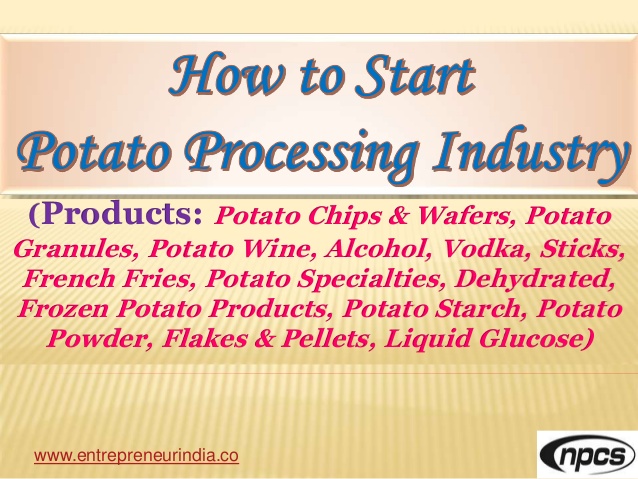
Potato is not just a staple food; it’s a powerful raw material for a wide array of profitable processed products. From crispy chips and frozen French fries to innovative offerings like potato wine and vodka, the potato processing industry offers huge business opportunities for food entrepreneurs. Whether you’re targeting the snacks market, food service sector, or beverage innovation, investing in potato-based products can lead to sustainable success. Starting this industry requires strategic planning, the right technology, and a solid understanding of processing methods.
Opportunities in the Potato Processing Industry
The global demand for potato-based snacks, frozen foods, and beverages is rising rapidly. Changing lifestyles, increased working populations, and urbanization are pushing the growth of ready-to-eat and ready-to-cook products. The potato, with its high yield, easy availability, and processing versatility, stands out as one of the most adaptable raw materials in the agro-processing space.
See Also – Air & Water Effluent Treatment
Moreover, India ranks among the top five potato producers in the world, providing abundant raw materials for new entrepreneurs. By leveraging proper grading, storage, and value addition, a potato processing business can become a profitable venture.
Let’s explore the key sub-sectors and product categories within the potato processing industry.
Potato Chips and Wafers Manufacturing
One of the most popular and low-investment potato processing ideas is the production of chips and wafers.
Raw Materials: Fresh potatoes (high starch varieties), edible oil, salt, and flavoring agents.
Process Flow: Washing ? Peeling ? Slicing ? Blanching ? Drying ? Frying ? Seasoning ? Packaging.
Equipment Required: Potato slicers, batch fryers, oil filters, spice mixers, nitrogen-flush packaging machines.
Market Potential: The snacks segment continues to grow, with flavored chips and healthier options (low salt, baked) becoming popular. By using modern packaging and regional flavors, small manufacturers can build loyal consumer bases.
Moreover, customized packs for vending, airlines, and school lunches offer niche market entry points.
Frozen French Fries & Potato Sticks
Frozen French fries are highly demanded in quick-service restaurants, fast food chains, and supermarkets.
Process Overview:
-
Grading and sorting
-
Washing and peeling
-
Cutting into strips
-
Blanching
-
Pre-frying
-
Freezing (IQF – Individual Quick Freezing)
-
Packaging
Machinery Needed: Automatic peeling machines, French fry cutters, blanchers, fryers, IQF tunnel freezers, flow-wrap packers.
Storage & Shelf Life: Frozen fries must be stored at ?18°C to maintain quality. Shelf life is typically 6–12 months.
Profit Factor: While initial investment is higher, margins are better due to bulk supply to institutional buyers.
Additionally, expanding into allied products like crinkle-cut fries, potato wedges, and hash browns enhances your product line.
Dehydrated and Dried Potato Products
Dehydrated potatoes are used by snack manufacturers, instant meal producers, and institutional kitchens. These products include:
-
Potato flakes
-
Potato granules
-
Potato powder
-
Dehydrated cubes or slices
Drying Techniques:
-
Hot air drying
-
Drum drying
-
Spray drying (for powders)
-
Freeze drying (for premium applications)
Applications:
Used in instant mashed potatoes, soups, extruded snacks, and even baby food.
Market Tip: Hotels, restaurants, and catering (HoReCa) segments often demand bulk dehydrated products for convenience and longer shelf life.
Furthermore, these lightweight products are ideal for exports, especially to countries lacking local potato supply.
Potato-Based Alcohol: Wine, Vodka & Spirits
One of the most innovative ways to tap into potato processing is by venturing into craft alcohol production using potatoes.
1. Potato Wine:
-
Fermentation of potato mash with yeast, sugar, and enzymes.
-
Low-cost, low-alcohol beverage with niche rural and tribal appeal.
2. Potato Vodka:
-
Premium distilled spirit produced by fermenting and distilling potatoes.
-
Requires fermentation tanks, distillation columns, chillers, and filtering units.
USP:
Potato vodka is naturally gluten-free and appeals to health-conscious, premium alcohol consumers.
Licensing Required:
You must obtain food safety (FSSAI), state excise, and pollution control licenses. Also, compliance with alcohol labeling and taxation laws is critical.
Export Angle:
Craft spirits and farm-based distilleries are trending globally. Thus, a well-branded potato vodka line can fetch excellent export margins.
Potato Specialties and Extruded Snacks
This category includes novel and customized snack items like:
-
Potato pellets
-
3D shapes
-
Cheese balls
-
Masala sticks
-
Potato fingers with cheese stuffing
These are manufactured using extruders and fryers, followed by seasoning and packaging.
Market Tip:
Sell via B2B to snack companies or direct to retail under your brand. Schools, party packs, and regional masala flavors are trending sub-niches.
In contrast to traditional snacks, these offer better scalability and shelf life with the help of food-grade packaging.
Ready-to-Cook & Frozen Potato Dishes
This growing segment includes:
-
Aloo tikki
-
Samosa filling
-
Frozen stuffed potato skins
-
Potato patties
-
Chilly potato mixes
These products cater to the frozen food section in supermarkets and quick food services.
Technology Tip:
Use blast freezers or IQF technology for superior texture and shelf life. Focus on hygienic processing and food-grade, tamper-proof packaging.
Furthermore, vegan and gluten-free labeling can give your brand a competitive edge.
Infrastructure & Machinery Setup
Starting a potato processing unit involves careful selection of equipment based on product mix.
Basic Equipment Includes:
-
Potato washer and peeler
-
Conveyor and slicer
-
Fryers (batch or continuous)
-
Dehydrators
-
Cold storage units
-
Packaging machines
-
Blanchers and IQF freezers (for frozen foods)
-
Distillation equipment (for alcohol production)
You’ll also require a clean processing hall, stainless steel surfaces, and water treatment systems.
Land Area:
For a small-scale unit: 2000–3000 sq. ft.
For a medium-sized setup with cold storage: 8000–12,000 sq. ft.
Licensing, Approvals, and Compliance
To start a potato processing business, you must obtain:
-
FSSAI license
-
GST registration
-
MSME Udyam registration
-
Factory license
-
Pollution clearance (especially for fryers and distillation)
-
Cold chain license (if storing frozen products)
-
IEC code (for export)
If you’re producing potato vodka or wine, state excise clearance is mandatory.
Moreover, compliance with HACCP, ISO 22000, and Good Manufacturing Practices (GMP) can help in expanding to export markets.
Branding, Packaging, and Marketing
Good packaging extends shelf life, ensures safety, and boosts sales appeal.
Options Include:
-
Vacuum-sealed pouches
-
Nitrogen-flushed packets
-
LDPE or PET-based food-grade packaging
-
Printed boxes with QR codes for traceability
Marketing Channels:
-
Distributors and FMCG stockists
-
Online marketplaces (Amazon, BigBasket)
-
Food expos and trade fairs
-
Institutional supply to hotels and caterers
Tip:
Highlight product features like “no preservatives”, “farm fresh”, “gluten-free”, or “handcrafted” to attract modern consumers.
Cost Estimation and Profit Margins
Startup Cost for Small Unit: ?15–25 lakhs
Medium Unit (with cold storage/IQF): ?40–80 lakhs
Large Vodka/Wine Plant: ?1–3 crore (including distillery setup)
Gross Margin: 30%–50% depending on the product category.
Breakeven Time: 1–2 years with consistent demand and controlled overhead.
As a result, adding new products over time boosts brand presence and revenue streams.
See Also – Gypsum Plaster Board
Conclusion
To conclude, starting a potato processing industry offers immense potential for entrepreneurs looking to enter the food manufacturing sector. With the flexibility to produce chips, fries, granules, frozen foods, and even alcoholic beverages, potatoes present a versatile and profitable avenue. Moreover, rising demand for convenient, hygienic, and packaged foods ensures a long-term growth trajectory. By selecting the right products, investing in efficient machinery, and complying with food safety norms, you can build a successful agro-processing venture. Whether you’re launching a snacks brand or a specialty vodka label, the humble potato could be your key to sustainable business success.





